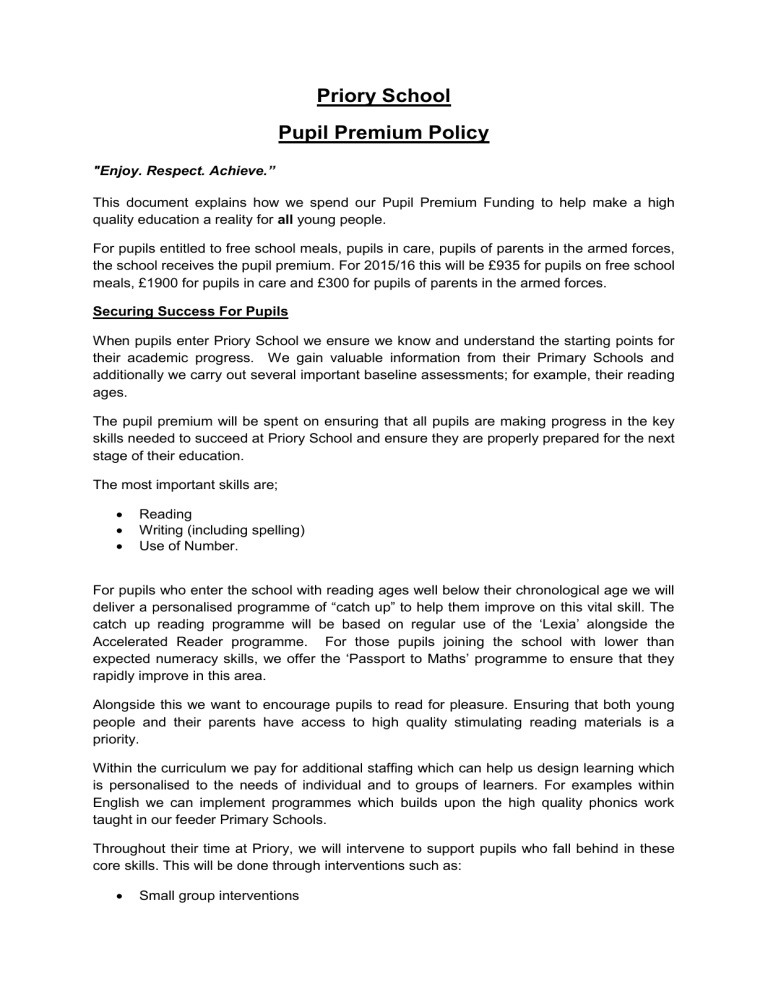Priory School Pupil Premium Policy

Priory School
Pupil Premium Policy
"Enjoy. Respect. Achieve.
”
This document explains how we spend our Pupil Premium Funding to help make a high quality education a reality for all young people.
For pupils entitled to free school meals, pupils in care, pupils of parents in the armed forces, the school receives the pupil premium. For 2015/16 this will be £935 for pupils on free school meals, £1900 for pupils in care and £300 for pupils of parents in the armed forces.
Securing Success For Pupils
When pupils enter Priory School we ensure we know and understand the starting points for their academic progress. We gain valuable information from their Primary Schools and additionally we carry out several important baseline assessments; for example, their reading ages.
The pupil premium will be spent on ensuring that all pupils are making progress in the key skills needed to succeed at Priory School and ensure they are properly prepared for the next stage of their education.
The most important skills are;
Reading
Writing (including spelling)
Use of Number.
For pupils who enter the school with reading ages well below their chronological age we will deliver a personalised programme of “catch up” to help them improve on this vital skill. The catch up reading programme will be based on regular use of the ‘Lexia’ alongside the
Accelerated Reader programme. For those pupils joining the school with lower than expected numeracy skills, we offer the ‘Passport to Maths’ programme to ensure that they rapidly improve in this area.
Alongside this we want to encourage pupils to read for pleasure. Ensuring that both young people and their parents have access to high quality stimulating reading materials is a priority.
Within the curriculum we pay for additional staffing which can help us design learning which is personalised to the needs of individual and to groups of learners. For examples within
English we can implement programmes which builds upon the high quality phonics work taught in our feeder Primary Schools.
Throughout their time at Priory, we will intervene to support pupils who fall behind in these core skills. This will be done through interventions such as:
Small group interventions
One to One Tuition
Assertive Mentoring
Core Group Programmes
Supporting Pupils ’ Well-Being and Behaviour
We believe that employing high quality staff to help pupils overcome their particular barriers to learning is essential. There are many pupils who do rely on this to succeed at school and without this personal approach will become disengaged from school. This mentoring will mean supporting pupils, emotionally but also ensuring that they are challenged to work hard, succeed and overcome their barriers to learning. For example,
Counselling
ELSA support
Additional Careers advice
Pupil Support Workers
Progress team attached to each year group
Ensuring Equality of Access to the Curriculum
A key aspect of our ethos at Priory School is our belief that we need to develop memorable learning experiences. This includes curriculum trips and visits. We also believe that all pupils benefit greatly from a residential experience. Our developing enrichment programme is extensive and inclusive. The student premium will be used to support pupils whose families are on low incomes to access all of these programmes.
We believe that talents such as sport, music, dance and drama will only develop into a lifelong passion by providing a high quality extended curriculum.
The student premium will also help all pupils access this curriculum and help pupils discover their talents. For example,
Support for Year Group Trips
Free Music Tuition
Access to Sports Clubs
Support for Language Trips
Monitoring and Review
The Plans and budgets for Pupil Premium are reviewed on an annual basis and interventions and impact reported to the governors.
Review of the progress of the cohort of the FSM pupils ’ performance and progress takes place each term.
Every pupil has an allocated key worker to track and monitor access to appropriate provision to support the pupils’ development
There is individual monitoring of attendance, Attitudes to Learning (ATLs), Progress
Grades and GCSE performance of the pupils registered as FSM/Ever 6.
40.2% FSM
31% of Year 11 disadvantaged pupils achieved 5A*-C with English and Maths in
2015 compared to 52% of other pupils (within school gap of 21%). This compares to a national gap of 27% in 2015.
2015 VA of disadvantaged pupils was 964.2, compared to 991.2 for other pupils (27 point in school gap). National VA gap between disadvantaged and other pupils in
2015 was 32.9 points (RAISE 2015 5.1.3).
Expected progress KS2-4
2014 2015 2016(Projected)
English
Maths
51%
42%
64%
46%
75%
57%
Internal tracking data for the majority of pupils indicates progress in ATLs and/or
Progress during the course of the year.
Achievement for All 2014/15
Mentoring programme run through 2014/15 to identify underachievement in vulnerable pupils and provide bespoke support and intervention.
There are 233 pupils involved in the programme. The majority of these pupils are Pupil
Premium pupils (85% - 199).
Parental engagement this year remains in line with last year at around 72%.
Pupils were identified to be involved based on under achievement and the progress of PP pupils who engaged with this programme was significant.
IMPACT: Year 9
Number of pupils
AFA impact
42
IMPACT: Year 8
Number of pupils
AFA impact
43
Expected progress- end of
Year 8)
English
26%
Maths
17%
Pupils progress post AFA year 9
English
33%
(7% increase)
Maths
55%
(38%increase)
Expected progress-end of Year
7)
English
28%
Maths
30%
Pupils progress post AFA in year
8
English Maths
30%
(2% increase)
53%
(23% increase)



![afl_mat[1]](http://s2.studylib.net/store/data/005387843_1-8371eaaba182de7da429cb4369cd28fc-300x300.png)




